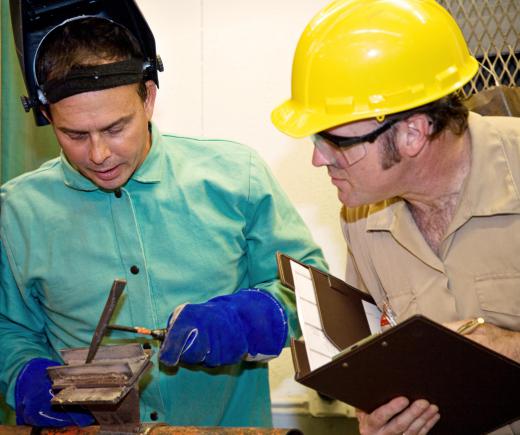At WiseGEEK, we're committed to delivering accurate, trustworthy information. Our expert-authored content is rigorously fact-checked and sourced from credible authorities. Discover how we uphold the highest standards in providing you with reliable knowledge.
What does a Process Operator do?
Process operators oversee the operations of plants or factories to ensure efficiency. They may be required to oversee production in accordance to the policies or guidelines established by supervisors or employers. In addition, the operator must gain in-depth knowledge of the plant’s distributed control system (DCS), and may be asked to review and implement safety protocols. Usually, only a high school diploma is required, although a degree from a college or university improves an applicant’s chances of being hired and raises his or her salary prospects.
Process operators primarily make certain that a plant or factory is functioning properly using the DCS. The DCS monitors and controls a factory’s equipment through an elaborate network of wires and hubs. This system allows an operator to identify potential hazards like too much pressure and overheating. He or she may also use the DCS to fuel certain machines or commence certain operations. While monitoring the factory, a process operator will have to resolve problems as soon as possible to ensure that production remains at the most efficient capacity possible; maintenance is an important aspect of the job.

If employed by a manufacturer of consumer goods, a process operator may be required to perform random tests of quality assurance. During this process, a sample is taken from the overall batch and sent to a laboratory or panel for review. These reviews provide feedback on the product’s efficacy. The operator is then responsible for archiving the responses and, in some cases, taking appropriate measures to improve the product based on the criticism received.

Process plant operators must also maintain the plant in a manner that conforms with rules and regulations established by state or local governments. Consequently, a process plant operator should be intimately familiar with these rules. Furthermore, the operator may be responsible for reprimanding employees who do not conduct themselves in a safe manner.
A high school diploma is the minimum requirement for working as a process operator. In cases where the employers provide process operator training, a degree from a college or university is not required. For long-term goals such as salary raises and promotions, however, a bachelor’s degree or technical certification is recommended. Process operators work in plants or factories and may be subjected to harsh and dangerous working conditions at times, examples include dust, noise, and chemicals.
AS FEATURED ON:
AS FEATURED ON:












Discuss this Article
Post your comments